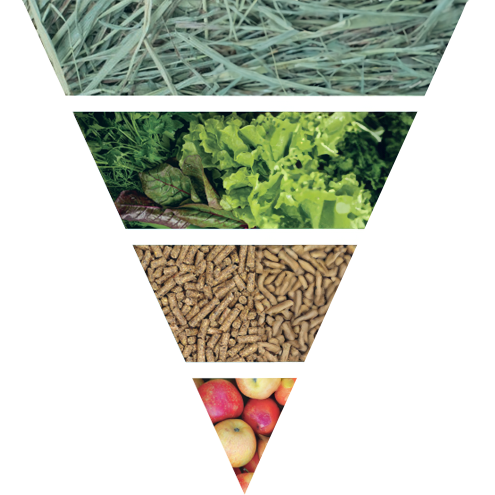What to feed your rabbit
Feeding your rabbit a good diet is essential to making them a healthy, happy rabbit—and despite what popular cartoons have portrayed, rabbits need to eat more than just carrots (which should only ever be given in small quantities, due to its high sugar content). Rabbits have a very sweet tooth and it’s up to you to make sure your rabbit is eating well!
What to feed an adult rabbit (1-5 years)
- Unlimited hay
- Minimum 2 cups chopped vegetables per 6 lbs. of body weight per day
- 1/4 cup pellets per 6 lbs. of body weight per day
- Treats given only sparingly

Hay
Rabbits need unlimited amounts of hay! It’s the most important thing for them to eat, since it keeps their GI system moving properly and helps prevent blockages. Timothy, orchard, oat, and other grass hays are good for adult rabbits. Alfalfa hay should only be given to nursing mothers and young rabbits.
A rabbit’s teeth are continuously growing, and eating hay also helps wear them down. Rabbits who don’t eat enough hay can develop painful points on their teeth which can grow at different angles and cut into their tongue, gums, and cheeks, and cause them to stop eating. When this happens, rabbits must receive veterinary care for these points to be filed down.
Vegetables
Rabbits should get a minimum of three different types of leafy green vegetables daily to help them obtain the vitamins and nutrients they need. Eliminate any vegetables that cause your rabbit to have soft stool or diarrhea. Every rabbit is different, and you’ll need to find what foods work best for your rabbit, based on their health and sensitivity to certain foods.
See below for a list of veggies.
Pellets
A good quality pellet should be relatively high in fiber (18% minimum fiber). While nursing mothers and young rabbits need to eat a lot of pellets, it should make up less of their diet as they grow older. Alfalfa-based pellets are fine for young rabbits, but timothy-based ones are preferred for adults. Never feed your rabbit pellets that have fruits, seeds, nuts, corn, or yogurt drops mixed in.
Treats
Look for hay-based treats, like Selective Natural’s loop treats or anything from Oxbow’s Simple Rewards line. Fresh fruits shouldn’t be more than 10% of a rabbit’s diet, or about 1 teaspoon per 2 pounds of body weight per day. Unless otherwise stated, it’s more nutritious to leave the skin on the fruit (particularly if organic), just wash thoroughly
- Apple (any variety, without stem and seeds)
- Apricot
- Banana (remove peel)
- Berries (any type)
- Cherries (any variety, without the pits)
- Grapes
- Kiwi
- Mango
- Melons (any type)
- Papaya
- Peach
- Pear
- Pineapple (remove skin)
- Plum (without the pits)
- Star Fruit
Vegetables safe to give your rabbits
Leafy Vegetables
- Arugula
- Basil (any variety)
- Beet greens*
- Bok Choy
- Borage leaves
- Carrot tops
- Chicory
- Cilantro
- Cucumber leaves
- Dandelion greens
- Dill leaves
- Endive
- Escarole
- Fennel (the leafy tops and the base)
- Frisée
- Kale (all types)
- Mache
- Mint (any variety)
- Mustard greens*
- Parsley*
- Radicchio
- Radish tops*
- Raspberry leaves
- Red or green lettuce
- Romaine lettuce
- Spring greens
- Sprouts*
- Swiss chard*
- Turnip greens
- Watercress
- Wheatgrass
- Yu choy
*need to be rotated due to oxalic acid content and only 1 out of three varieties of greens a day should be from these.
Non-Leafy Vegetables
- Bell peppers (any type)
- Broccoli (leaves and stems)
- Broccolini
- Brussel sprouts
- Cabbage (any type)
- Carrots
- Celery
- Chinese pea pods (flat without large peas)
- Edible flowers (roses, nasturtiums, pansies, hibiscus)
- Summer squash
- Zucchini squash
Download a handout about rabbit diet!
Get it HereSign up to Our Newsletter!
Sign up for web update alerts and our monthly e-newsletter
to stay current on HRS, our Chapters, and info for your bunny.



